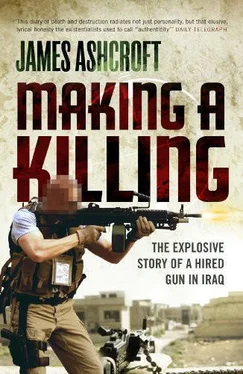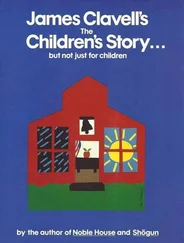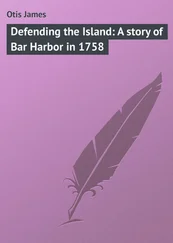The drivers behind the explosion slammed on their brakes and were zigzagging across the road as they piled into the back of each other.
Les instinctively pulled straight off the road and cut across the desert towards the ball of flames. There was small-arms fire thundering into the ground and little fireballs of petrol were raining down, splattering on the car roof and cleaning the windscreen. It was like Guy Fawkes night. The Arab drivers were jumping out of the cabs and fleeing in the opposite direction of the rifle fire, which was sensible: they were driving 50,000-gallon bombs.
Two of the Humvees were close to the explosion. They had been lucky not to be engulfed by the blast and the men inside were putting down return fire by the time we got there. Had there been more American soldiers we would have let them get on with it, but there were just half a dozen guys and we weren’t going to leave them to take on an army of insurgents if that was what was out there dug into the desert.
Colonel Hind was following in his vehicle, yelling instructions over the radio, although we couldn’t be sure if he was telling us to stay away or join in the battle.
We remained about 100 metres south of the Humvees. Seamus, Les and I took up fire positions and started putting a few rounds back at the enemy. Sammy slipped into the driver’s seat and kept the engine running. I estimated there were about a dozen bad guys. They had two or three belt-fed weapons, at least one RPG, and five or six more were firing small arms.
The South Africans cleared the Nissan with their belt-fed guns and began spraying 7.62 at the main fire coming from the cluster of buildings off to our right. In spite of not having radio comms with the American soldiers, they could see what we were doing.
The gunner on the nearest Humvee let loose at the house where most of the enemy fire appeared to be coming from in a long burst from his Mk19, a fearsome weapon with a short, stumpy barrel that throws out 40mm high-explosive grenades. I had never seen one fired in anger before. Holy shit!
Hind, his driver and the guy in glasses didn’t budge from their SUV throughout the contact. Remaining inside a vehicle in this way seemed to make people feel safe; the French journalist Michel Delacroix certainly gave that impression on the road back from Fallujah, but these were military men and should have known better. The SUV was a plum target for an RPG and what they were doing sitting there was a complete mystery to me.
The exchange of fire was going nowhere. The insurgents were melting away surprisingly quickly and what fire they did return could have been coming from any of the hundreds of windows in the apartment buildings overlooking the highway.
Our priority was getting the remainder of the convoy moving, not going on a wild-goose chase across the desert. Firing from the enemy position became sporadic: the terrorists were learning that when there was superior fire power it was best to draw back and try another tactic.
The dust had settled during the firefight and we only now became aware that the front half of the convoy had vanished over the horizon. The drivers from the abandoned trucks were chasing about like headless chickens but didn’t need much persuasion to climb back in their own vehicles. Sure, they were driving 50,000-gallon bombs, but better that than getting left outside Mahmudiya among tribesmen who knew they had been working for the Yankee Zionist Crusaders.
The drivers pulled themselves up into their cabs babbling prayers. The Americans in the two Humvees seemed pleased to have seen some decent action without taking any hits and took up positions at the front of our half of the convoy.
We took off at 140 klicks to catch up with the other half. It was like trying to put the two halves of a pantomime horse back together. The front half of the convoy was lumbering along in a huge cloud of dust and we spotted the Humvee at the back in about ten minutes. The Mk19 grenade launcher was aimed at our windscreen, but we had the Stars and Stripes stuck on the glass and we moved by without any hassle. We got to the front, slowed the pace to allow the back half of the convoy to play catch up and wound our way to the big oil depot beside the main railway station in Baghdad.
Colonel Hind strutted around pressing flesh and telling the guys they’d done a great job. He had proved, at least in his own mind, that his presence had saved the day. We had lost one tanker, but what the hell, they had fought off a brigade of foreign fighters and they could have lost the lot.
‘Good job, Corporal, where you from?’ asked Colonel Hind.
‘Ohio, sir.’
‘Well, you can write home to the folks in Ohio and tell them you’re a hero.’
He shook hands with the Arab driver who had led the convoy.
‘I am from Alexandria,’ said the driver. ‘Very beautiful.’
‘I’m sure it is, son.’ He grinned at all the soldiers. ‘Good job, everyone.’
The officer with the gold-rimmed glasses had one of those clickers and was counting in the trucks. Les Trevellick, an engineer, a good maths man, was counting on his fingers. The tankers were coming in sporadically like marathon runners.
‘That’s ten,’ said Les.
The guy in gold glasses nodded.
Two more, then another one. Then three together.
Colonel Hind spotted me hiding behind the Yaapie wagon and marched over. He stuck his hand out. ‘That’s the way to do it, Captain Ashcroft,’ he said. ‘We make a great team.’
‘If you say so, Colonel Hind.’
‘I do, son, I do. We’re going to whip this country into shape, you wait and see. We knocked those terrorists six days from Sunday.’
I heard Les shout ‘ten’ as another truck turned through the gate and brought the total so far to twenty.
It seemed to take an hour before all the trucks were in the depot, but it was probably no more than twenty minutes. Les and the American officer counted in 43 trucks. Behind the last one was the pair of American Humvees that had taken the tail position when we left Latifiyah.
‘That’s forty-three,’ said Les.
The American translated for Colonel Hind. ‘Forty-three, sir,’ he said. We were way short of the 65 we had started with.
‘That can’t be right. Check again.’ The winning smile faltered.
Sergeant Harvey stood at the gate looking down the road. It was empty. Les and the officer in gold specs counted the trucks together. There were 43.
We all took a look up the road. And we all counted the trucks.
One tanker had been blown up.
Twenty-one had vanished into thin air.
Well, not in the strictest sense of the word. Twenty-one drivers had driven off into the dust never to be seen again. We discovered on questioning the Egyptian drivers of the 43 trucks who had made it into the depot that all the missing vehicles had been driven, as far as we could gather, by Iraqis. The local drivers knew the desert tracks between Mahmudiya and Latifiyah and, we assumed, they knew where they could shift 21 × 50,000 gallons of petrol on the black market.
Colonel Hind would write up in his report that we had lost the tankers in a firefight with fedayeen terrorists, but a lot of acts attributed to the insurgency were just plain banditry and for me the barefaced theft of 21 trucks of petrol bore the hallmarks of a well-organised criminal gang. First the bombardment with dud rockets overnight. Then the explosion of one truck to create mayhem. The gunmen took a few pot shots then fled. I had thought we were lucky to lose just one tanker. Now I understood that they had only needed to destroy one as a diversion. They had not melted away in fear of the spectacular hail of grenades from the Mk19, but because their job was done.
We would have been able to establish the facts more clearly had we had more men to go forward after the contact and search for enemy bodies and other evidence. It didn’t happen. It wasn’t going to happen. Mahmudiya and Latifiyah were two towns notorious for their violent inhabitants. Iraqis avoided them. They were more likely to be kidnapped and killed than we were; we were better trained and more heavily armed.
Читать дальше












